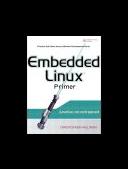Книга: Embedded Linux Primer: A Practical, Real-World Approach
15.4.2. Debugging Multithreaded Applications
15.4.2. Debugging Multithreaded Applications
If your application uses the POSIX thread library for its threading functions, GDB has additional capabilities to handle concurrent debugging of a multithreaded application. The Native Posix Thread Library (NPTL) has become the de facto standard thread library in use on Linux systems, including embedded Linux systems. The rest of this discussion assumes that you are using this thread library.
For this section, we use a demonstration program that spawns a number of threads using the pthread_create() library function in a simple loop. After the threads are spawned, the main() routine simply waits for keyboard input to terminate the application. Each thread displays a short message on the screen and sleeps for a predetermined time. Listing 15-14 shows the startup sequence on the target board.
Listing 15-14. Target Threads Demo Startup
root@coyote:/workspace # gdbserver localhost:2001 ./tdemo
Process ./tdemo created; pid = 671
Listening on port 2001
Remote debugging from host 192.168.1.10
^^^^^ Previous three lines displayed by gdbserver
tdemo main() entered: My pid is 671
Starting worker thread 0
Starting worker thread 1
Starting worker thread 2
Starting worker thread 3
As in our previous examples, gdbserver prepares the application for running and waits for a connection from our host-based cross-gdb. When GDB connects, gdbserver reports the connection with the Remote debugging... message. Now we start GDB on the host and connect. Listing 15-15 reproduces this half of the session.
Listing 15-15. Host GDB Connecting to Target Threads Demo
$ xscale_be-gdb -q tdemo
(gdb) target remote 192.168.1.141:2001
0x40000790 in ?? ()
(gdb) b tdemo.c:97
Breakpoint 1 at 0x88ec: file tdemo.c, line 97.
(gdb) c
Continuing.
[New Thread 1059]
[New Thread 1060]
[New Thread 1061]
[New Thread 1062]
[New Thread 1063]
[Switching to Thread 1059]
Breakpoint 1, main (argc=0x1, argv=0xbefffdd4) at tdemo.c:98
98 int c = getchar();
(gdb)
Here we connect to the target (resulting in the " Remote debugging... " message in Listing 15-14), set a breakpoint just past the loop where we spawned the new threads, and continue. When the new thread is created, GDB displays a notice along with the thread ID. Thread 1059 is the TDemo application, doing its work directly from the main() function. Threads 1060 through 1063 are the new threads created from the call to pthread_create().
When GDB hits the breakpoint, it displays the message [Switching to Thread 1059], indicating that this was the thread of execution that encountered the breakpoint. It is the active thread for the debugging session, referred to as the current thread in the GDB documentation.
GDB enables us to switch between threads and perform the usual debugging operations such as setting additional breakpoints, examining data, displaying a backtrace, and working with the individual stack frames within the current thread. Listing 15-16 provides examples of these operations, continuing directly with our debugging session started in Listing 15-15.
Listing 15-16. GDB Operations on Threads
...
(gdb) c
Continuing.
<<< Ctl-C to interrupt program execution
Program received signal SIGINT, Interrupt.
0x400db9c0 in read () from /opt/mvl/.../lib/tls/libc.so.6
(gdb) i threads
5 Thread 1063 0x400bc714 in nanosleep ()
from /opt/mvl/.../lib/tls/libc.so.6
4 Thread 1062 0x400bc714 in nanosleep ()
from /opt/mvl/.../lib/tls/libc.so.6
3 Thread 1061 0x400bc714 in nanosleep ()
from /opt/mvl/.../lib/tls/libc.so.6
2 Thread 1060 0x400bc714 in nanosleep ()
from /opt/mvl/.../lib/tls/libc.so.6
* 1 Thread 1059 0x400db9c0 in read ()
from /opt/mvl/.../lib/tls/libc.so.6
(gdb) thread 4 <<< Make Thread 4 the current thread
[Switching to thread 4 (Thread 1062)]
#0 0x400bc714 in nanosleep ()
from /opt/mvl/.../lib/tls/libc.so.6
(gdb) bt
#0 0x400bc714 in nanosleep ()
from /opt/mvl/.../lib/tls/libc.so.6
#1 0x400bc4a4 in __sleep (seconds=0x0) at sleep.c:137
#2 0x00008678 in go_to_sleep (duration=0x5) at tdemo.c:18
#3 0x00008710 in worker_2_job (random=0x5) at tdemo.c:36
#4 0x00008814 in worker_thread (threadargs=0x2) at tdemo.c:67
#5 0x40025244 in start_thread (arg=0xfffffdfc) at pthread_create.c:261
#6 0x400e8fa0 in clone () at../sysdeps/unix/sysv/linux/arm/clone.S:82
#7 0x400e8fa0 in clone () at../sysdeps/unix/sysv/linux/arm/clone.S:82
(gdb) frame 3
#3 0x00008710 in worker_2_job (random=0x5) at tdemo.c:36
36 go_to_sleep(random);
(gdb) l <<< Generate listing of where we are
31 }
32
33 static void worker_2_job(int random)
34 {
35 printf("t2 sleeping for %dn", random);
36 go_to_sleep(random);
37 }
38
39 static void worker_3_job(int random)
40 {
(gdb)
A few points are worth mentioning. GDB assigns its own integer value to each thread and uses these values to reference the individual threads. When a breakpoint is hit in a thread, all threads within the process are halted for examination. GDB marks the current thread with an asterisk (*). You can set unique breakpoints within each threadassuming, of course, that they exist in a unique context. If you set a breakpoint in a common portion of code where all threads execute, the thread that hits the breakpoint first is arbitrary.
The GDB user documentation referenced at the end of this chapter contains more useful information related to debugging in a multithreaded environment.
- CHAPTER 6 Productivity Applications
- Available Applications
- 15.4. Debugging Multiple Tasks
- Chapter 12. Debugging your scripts
- Compiling the user-land applications
- Debugging, a necessity
- Bash debugging tips
- System tools used for debugging
- Iptables debugging
- Other debugging tools
- Productivity Applications Written for Microsoft Windows
- Lesson 2: Implementing System Applications




